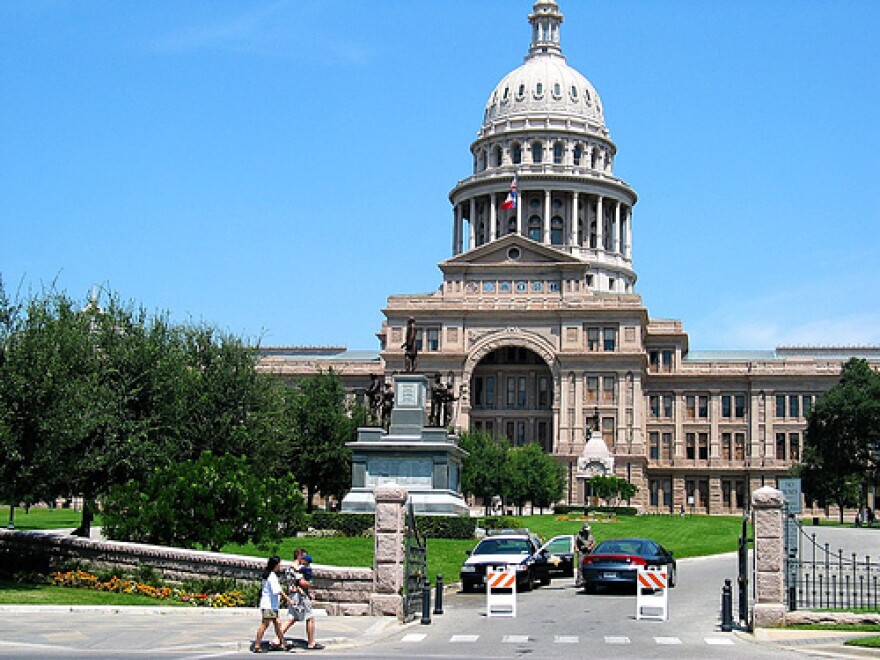By KERA News & Wire Services
Austin, TX – House members gave an initial stamp of approval Friday to having a statewide elected commissioner at the helm of the embattled Texas transportation agency.
The House tentatively approved a Texas Department of Transportation "sunset" bill in a non-recorded voice vote. The proposal also calls for the election of 14 regional commissioners. Currently the governor appoints a five-member transportation commission.
The sweeping TxDOT overhaul vote came in response to a scathing state sunset report that called for a revamp of the department's governing board and its dealings with lawmakers and the public. The bill by Rep. Carl Isett, R-Lubbock, removes some duties from the agency, including driver's license oversight. One provision added to the bill would prohibit state or local governments from adding automated "red light" cameras at intersections to catch traffic violators. Lawmakers also loaded a number of previously passed bills onto the TxDOT overhaul legislation.
Isett's legislation still needs another House vote before moving to the Senate.
TRANS FAT BAN
Daring to tinker with the hallowed formula for chicken fried steak and french fries, the Texas Senate voted Friday to ban the use of most trans fats in restaurants. But, fearing a backlash from the sweet tooth lobby, the lawmakers provided an exemption for trans fats used to make cakes, pies and other bakery items.
"The icing exemption," is what Democratic Sen. Eliot Shapleigh called the loophole, explaining that cake icing doesn't stay put without the hydrogen pumped into the oil - the very process that makes trans fats unhealthy. Other exemptions were provided for food served by grocery stores, fire departments and certain caterers, and the ban would be slowly phased in. Initially, it would impact only chain establishments. It would apply to all Texas restaurants by late 2011.
Another loophole - for nonprofit organizations - was inserted in part to ensure that corn dogs and other fried goodies served at rodeos and state fairs could still be cooked with trans fat. Shapleigh, the author of the bill, stressed that the ban only applies to the type of oil used - not the food itself - even as critics panned any attempt to mess with Texas fried food.
"Will you ban butter?" asked an indignant Sen. Kel Seliger, R-Amarillo, who voted against the bill. "We're going to coerce Jack-in-the-Box to cease serving fish and chips, bacon cheddar potato wedges, curly fries, chicken biscuits, sausage egg and cheese biscuits."
According to the America's Health Rankings study for 2008 by the United Health Foundation, 28.6 of Texans are considered obese, up from 26.1 percent in 2007. Texas ranked 46th in the overall health chart, according to the study.
SMOKING BAN
The House State Affairs Committee approved a watered down smoking ban bill Friday by a vote of 8-4. Advocates for a statewide ban, led by the coalition Smoke-Free Texas, praised the fact that a bill emerged from committee, but said it has concerns that the original intent of Republican Rep. Myra Crownover's legislation would be destroyed in the version that was approved. The coalition said it will address that worry as the bill moves forward in the final weeks of the legislative session.
The legislation was intended to eliminate smoking, and thus the dangers of second-hand smoke, in workplaces and public places. But the substitute measure would carve out exemptions, including bars.
Members of Smoke-Free Texas include the American Cancer Society, American Heart Association, American Lung Association, Texas PTA and the Lance Armstrong Foundation, among others.
In the Senate, a smoking ban bill remains in committee without a vote, despite the committee chair's pledge to support it. The Legislature adjourns June 1, so time is running out to pass bills.
AND YOUR LITTLE DOG, TOO
The Texas House on Thursday voted to extend protective orders in domestic violence cases to include four-legged family members. The bill would make it a first-degree felony punishable by up to a year in jail to threaten, harm or interfere with a pet owned by a person under a protective order or their family.
Representatives unanimously approved the measure, sending it to the Senate.

